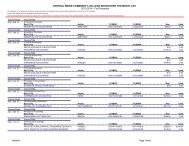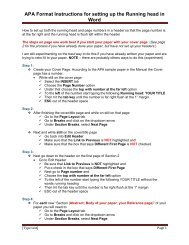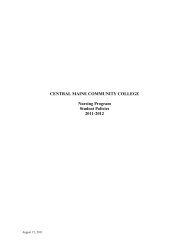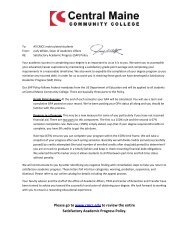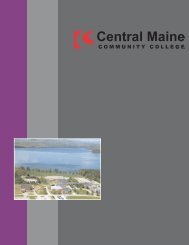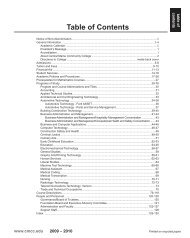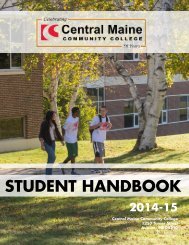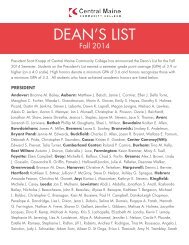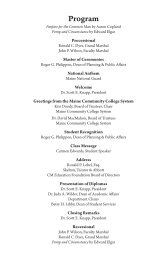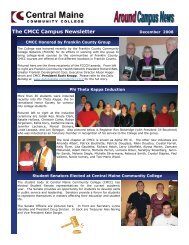Academic Policies and Procedures - Central Maine Community ...
Academic Policies and Procedures - Central Maine Community ...
Academic Policies and Procedures - Central Maine Community ...
Create successful ePaper yourself
Turn your PDF publications into a flip-book with our unique Google optimized e-Paper software.
policies <strong>and</strong><br />
procedures<br />
<strong>Academic</strong> <strong>Policies</strong> <strong>and</strong> <strong>Procedures</strong><br />
otherwise qualifi ed, may be eligible to receive<br />
academic support <strong>and</strong>/or accommodation(s).<br />
Eligibility is based on documentation that establishes<br />
that the individual has a disability <strong>and</strong> the<br />
current functional impact of the disability as it<br />
relates to the school environment. Reasonable<br />
academic accommodations are provided on an<br />
individual, case-by-case basis to an admitted or<br />
enrolled student. Essential components of any<br />
course of study may not be eliminated or circumvented.<br />
These accommodations are intended to<br />
promote equal access, not special privilege. It<br />
is the student’s responsibility to make the Disabilities<br />
Coordinator aware of his/her disability<br />
<strong>and</strong> possible need for accommodation. The Disabilities<br />
Coordinator may be reached by calling<br />
(207) 755-5277, or by appointment. Please refer<br />
to more detailed information below, including<br />
the grievance procedure that must be used by<br />
students for complaints regarding claims of disability<br />
<strong>and</strong> requests for accommodation. This<br />
information is also available on the college website<br />
<strong>and</strong> in the student h<strong>and</strong>book.<br />
Disability Service Procedure<br />
<strong>and</strong> Documentation<br />
Under federal law (Section 504 of the Rehabilitation<br />
Act of 1973 <strong>and</strong> the Americans with<br />
Disabilities Act of 1990, <strong>and</strong> Americans with<br />
Disabilities Act Amendment Act of 2008) qualified<br />
students with disabilities may be eligible to<br />
receive academic supports <strong>and</strong>/or accommodations.<br />
Eligibility is based on disability documentation<br />
<strong>and</strong> assessment of individual need.<br />
<strong>Central</strong> <strong>Maine</strong> <strong>Community</strong> College is committed<br />
to providing the means to enable equal access<br />
to education for admitted or enrolled students<br />
with disabilities.<br />
It is the student’s responsibility to make <strong>Central</strong><br />
<strong>Maine</strong> <strong>Community</strong> College’s Disabilities<br />
Coordinator aware of his/her disability <strong>and</strong><br />
need for accommodation in a timely manner<br />
including prior to or during the admissions<br />
process or prior to course registration. Students<br />
who believe they have a current <strong>and</strong> essential<br />
need for disability accommodations are<br />
responsible for requesting accommodations<br />
<strong>and</strong> providing required documentation to verify<br />
disability to the Disabilities Coordinator. The upto-date<br />
documentation is required to justify the<br />
possible need for reasonable accommodation(s)<br />
that provides equal access to programs <strong>and</strong> services<br />
at the college.<br />
Documentation must be typed on official letterhead<br />
of the diagnosing practitioner. The practitioner<br />
must be a licensed <strong>and</strong> /or certified professional<br />
who is qualified to diagnose the stated<br />
disability <strong>and</strong> not related to the student. It must<br />
be current for the disability (for learning disability,<br />
within five years <strong>and</strong> adult scales; for all other<br />
disability areas, within one year). Documentation<br />
must include the following components:<br />
1. Diagnosis must be described from Diagnostic<br />
<strong>and</strong> Statistical Manual of Mental Disorders<br />
IV or latest edition (if appropriate).<br />
2. Date first diagnosed <strong>and</strong> beginning<br />
treatments or services. A general history<br />
<strong>and</strong> clinical interview should be included.<br />
3. A description of the comprehensive diagnostic<br />
tests/methods used, including specifi<br />
c test scores (The report should contain<br />
raw scores, converted st<strong>and</strong>ard scores,<br />
index scores as applicable, including st<strong>and</strong>ard<br />
test scores <strong>and</strong> age equivalents) <strong>and</strong><br />
examiner’s narrative interpretation. This<br />
description should rule out other disability<br />
areas.<br />
4. A clear, direct statement of diagnosis.<br />
The diagnostician should avoid the use of<br />
such terms as “appears” or “seems” or “is<br />
indicative of.” If the data does not confirm<br />
a disability, the evaluator should state that<br />
conclusion in the report.<br />
5. A description of the current functional<br />
impact of the disability. This must establish<br />
what major life activity is substantially limited.<br />
Explanation of functional limitations<br />
from the impairment that may adversely<br />
affect the individual in an academic college<br />
program must be included.<br />
6. A statement of the method of treatment<br />
including current use of any medications,<br />
ability/inability to control symptoms, effects<br />
of medication that may adversely interfere<br />
with clear cognitive functioning.<br />
7. A description of the expected progression<br />
of symptoms, especially during college<br />
years.<br />
8. A history of previous accommodations<br />
<strong>and</strong> their impact.<br />
9. Recommendations based on functional<br />
<strong>and</strong> substantial limitations for college academic<br />
<strong>and</strong> physical accommodation.<br />
Once a student’s disability documentation is<br />
received, the Disabilities Coordinator will review<br />
the material to determine its completeness <strong>and</strong><br />
validity. If further information is deemed necessary,<br />
the Disabilities Coordinator will inform the<br />
individual within 30 academic class days. When<br />
the received documentation is complete, the<br />
Disabilities Coordinator will contact the student<br />
to set up a meeting. In an interactive process the<br />
student <strong>and</strong> Disabilities Coordinator will agree<br />
on what if any reasonable accommodations will<br />
be supported. A letter of accommodation will be<br />
generated by the coordinator <strong>and</strong> supplied to<br />
the student. The student then shares the letter<br />
with instructors of her/his choosing. The student<br />
must make an appointment with the Disabilities<br />
Coordinator at the beginning of each semester<br />
to update the accommodation letter. If a student<br />
does not have documentation but feels that he/<br />
she has a disability, a referral may be made<br />
by the Disabilities Coordinator. <strong>Central</strong> <strong>Maine</strong><br />
<strong>Community</strong> College does not provide this testing;<br />
it is at the student’s expense.<br />
Documentation minimums (for LD, NLD, AD/<br />
HD, Brain Injury, Autism, Psychiatric Disorders)<br />
1. Cognitive Component (WAIS IV, preferred,<br />
other comparable accepted)<br />
2. Achievement Component (WAIT III, preferred,<br />
other comparable accepted)<br />
3. Information Processing Component<br />
(WMS IV, Bender, executive functioning,<br />
Rey Osterrieth Complex Figure Test, or<br />
other appropriate tests)<br />
Other tests should be included that are appropriate<br />
to the particular area of disability pointed<br />
to from the above required components. For<br />
example, if from the information gathered it indicates<br />
that the individual has a writing disability,<br />
then it would be appropriate to complete the<br />
TOWL3 or latest edition.<br />
For AD/HD, it is appropriate to include rating<br />
scales by instructors, parents <strong>and</strong> the student,<br />
as well as the Connors Continuous Performance<br />
Test or other comparable test.<br />
Disabled students, like all students, are responsible<br />
for maintaining an acceptable level of<br />
conduct <strong>and</strong> academic achievement. Essential<br />
components of any course of study may not be<br />
eliminated or circumvented.<br />
20 www.cmcc.edu 2010 ~ 2011



